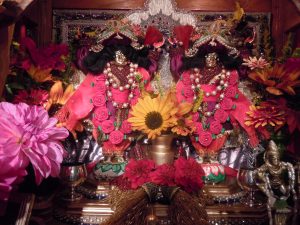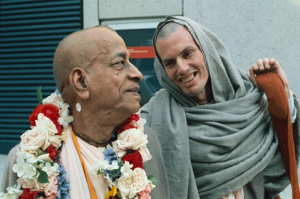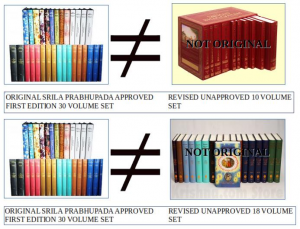April 18 1972 Hong Kong conversations
Guest (1): The Hare Kṛṣṇa movement has started in the United States. Why did it start in the United States, rather than India?
Prabhupāda: Because the United States, they are our best customer. A businessman goes to a place… Just like you have come here. Why you have come here? Wherever there is best possibility of doing your business, there you must go. I went to United States because I know these people are not poverty-stricken. And our Indian people, they are now, they have been trained to think like that—they are poverty-stricken. Actually, they are not poverty-stricken, but the leaders have educated them that, “You are all poverty-stricken.” This is India’s position. So far I knew that it would not be successful in India. The government will not help. The public is educated in a different way. They are after technology. So and “familiarity breeds contempt.” They say, “What is this Hare Kṛṣṇa movement? It is known to us since a long time. What effect it will have?” Many Indian students in foreign countries, they say, “Swamiji, what will this Hare Kṛṣṇa movement benefit us? We want technology.” So that is the mentality of the Indians at the present moment. They have lost everything and therefore they are beggars. They have lost their own culture and therefore they are beggars. So I thought it wise that I shall go to a country where there is no poverty. They will learn. They have enough. For material enjoyment, they have got enough. The material enjoyment means money and woman. That is, in America, it is lying on the street. As much as you like, you can take. But they are disgusted with this material enjoyment. Therefore they are coming as hippies. They are coming from very rich family. Their fathers, their grandfathers, are very rich. At least they belong to the richest nation. But they are not satisfied. They are not satisfied. That is the natural sequence. The Vedānta-sūtra says, athāto brahma jijñāsā. When one has satisfied his senses sufficiently, he is no longer interested in sense gratification. Perhaps you know C.R. Das, the name of C.R. Das in Calcutta. In those days, fifty years ago he was earning fifty thousand rupees per month, but he was not satisfied. And one day he and his wife were sitting together and the wife questioned, “Why do you look so morose? You have got everything at your command. Everyone respects you. You have got money. Everything you have got, education, popularity. Still, why you are unhappy?” So he simply, by chance he saw one mendicant was passing on the street, a sādhu beggar. So he said, “I want to become like him.” He said, “I want to be a mendicant like him.” So there are many instances in our history. Just like Bhārata Mahārāja. He was young man, twenty-four years old, and emperor of the whole planet, young wife, king, everything. He left everything. Bhārata Mahārāja passed long, long ago. Buddha, Lord Buddha, he was also prince and very young, and he was surrounded with dancing girls. But as soon as he came out on the street, he saw one old man. “What is this?” “This is old man. Everyone has to become old like this.” So he became immediately converted to a saintly person. “I must go and meditate and realize myself. Why shall I become old?” [break] I accept a new opportunities to preach it from everything. That is my philosophy. And it has become successful. If I had taken this position from India… I was trying. In India also, I tried. I wrote Mahatma Gandhi that “You are very respectable man, and people like you. You preach Bhagavad-gītā. You stand with your photograph. There is Bhagavad-gītā. Why don’t you preach Bhagavad-gītā? Now politics is finished. You have got independence.” But this politics is so sweet to these politicians, that until he was killed, he could not give up politics, until he was killed. He was advocating non-violence, but he was forced to die by violence. He wanted Hindu-Muslim unity. He was forced to accept partition of India. He was so much baffled, but still, he would not give up politics until he was killed. On the day of his death, in the morning, because he had so many letters, so many secretaries, so he said, “I am very much useless. I want to die.” He said like that. And actually, in the evening he was killed. He was thinking that “My next solace is only death,” because he could understand, “I have created simply problems. No problem I have solved. I have simply created problem.” He was a sane man. He could understand it. So similarly, everyone is creating simply problems, without solving… This United Nations, what they are doing for the last twenty years? Simply creating problems. So without Kṛṣṇa consciousness, there is no question of solving problems. That’s a fact. Any sane man, any philosopher, any scientist may come. I shall convince him.
Guest (1): How many disciples do you now have, sir, in the U.S.?
Prabhupāda: You cannot expect many disciples, but still, there are two thousand. Because I have got so many conditions and the fact is so difficult to understand, Kṛṣṇa consciousness. They have forgotten Kṛṣṇa, they have forgotten God, and I am trying to make them Kṛṣṇa conscious. It is a very difficult job. I have to shed my blood three tons before I make one convinced in Kṛṣṇa consciousness. That is my experience. I have to talk with him, especially these Europeans and Americans. They do not accept anything so blindly.
July 5 1976 Wash DC conversations
Rūpānuga: It is like a prisoner in the prison house thinking he has some freedom.
Prabhupāda: That freedom is danda jane raja jana nadi secu bhau.(?) Drowning the man in the water and, “Now you have independence, so breathe.” (laughter) So he breathes in, “Ah! Ah!” “All right, you are now a little relieved, all right, again. Again become drown.” “Oh! Save me, save me, save me, save me.” “All right,” take out, “now breathe, independently.“ This is independence. Danda jane raj jana nadi secu bhai.(?) The rascal does not know “I am breathing independent, but at any moment I can be drowned again.” Very correct example, danda jane raja jana nadi secu bhai.(?) No independence. Independence is only there when you fully surrender to Kṛṣṇa. You surrender your all independence to Kṛṣṇa. Then there is. “Kṛṣṇa, I have foolishly acted as independent, so many lives. Now I surrender all my independence at Your lotus feet. If You like, You can kill me; if You like, You can…,” that is independence. Otherwise, there is no independence. All foolishness. Ahaṅkāra-vimūḍhātmā. By false egotism, he’s thinking that “I am independent.”
June 20 1972 class….
So Bhaktivinoda Ṭhākura advises, “Never mind, you are in distress or happiness, but go on chanting this mahā-mantra.” Māyā-jāle baddha ho’ye, ācho miche kāja lo’ye. You are entrapped by the network of illusory energy, māyā-jāle baddha ho’ye, just like the fisherman catches from the sea all kinds of creatures within the network. Similarly we are also within the net of illusory energy, and because we have no freedom, therefore all our activities are useless. Action in freedom has got some meaning, but when we are not free within the clutches of māya, within the network of māyā, then our so-called freedom has no value. Therefore, whatever we are doing is simply defeat. Without knowing our constitutional position, if you are forced to do something by the pressure of the illusory energy, it is simply useless waste of time. Therefore, Bhaktivinoda Ṭhākura says, “Now you have got full consciousness in the human form of life. So just chant Hare Kṛṣṇa, Rādhā-Mādhava, all these names. There is no loss or great profit.” Jīvana hoilo śeṣa, nā bhajile hṛṣīkeśa. Now gradually everyone is on the verge of death, nobody can say that, “I shall remain, I shall stay for more hundred years.” No, any moment we can die. Therefore, he advises jīvana hoilo śeṣa: “Our life is at end at any moment, and we could not serve Hṛṣīkeśa, Kṛṣṇa. Bhaktivinodopadeśa.” Therefore Bhaktivinoda Ṭhākura advises, ekbār nām-rase māto re: “Please be enchanted, nām-rase, in the mellow of chanting the transcendental name. Dive yourself within this ocean. That is my request.”
Some Conclusions–The above three statements are indicative of Absolute Truth, not relative truth which most are interested in this material world. The first one Prabhupada is describing India and why he left that country and instead came to America to preach KC.. Indians have the mentality of poverty ( even though they have the most elevated culture in the world but have forgotten it) and want only technology and are even more crazy than Americans for it. They think this technology will save the day for them.
So Prabhupada left that country and came to America where he found the younger generation ready to accept the Vedic knowledge because they (we) were burnt out on sense gratification, having experienced it all. But it was not easy, as Americans and Europeans would not just accept this knowledge without argument. As he said he had to “shed blood three tons” before they would be convinced. But once convinced we accepted it and then spread it throughout the world upon Prabhupadas orders.
The last two statements illustrate the foolishness of trying to be happy in this world and he gives the example of being on a dunking stool which is very appropriate. We think we are happy here by all our plans but very quickly we are dunked once again into the water to suffer something else.
The last one is explaining how action in freedom has some meaning because as long as we are forced by the pressure of maya to act, then we are not actually free, which is what we all want to be. And that freedom can only come when surrender to God-Krsna. And that is done how?…. …
Bhaktivinoda Ṭhākura advises, ekbār nām-rase māto re: “Please be enchanted, nām-rase, in the mellow of chanting the transcendental name. Dive yourself within this ocean. That is my request.”
Hare Krsna
damaghosa das

PART OF THIS SUMMERS HARVEST-LOTS OF WINTER SQUASH-NOTICE THE “HARE KRSNA” ON THE ZUCCHINE





